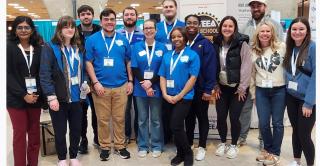

What courses have you have taken as a LAPR minor?
Introduction to Latino Studies
Race and Ethnic Relations
Social Movements and Collective Action
Latina Identity and Empowerment
Individual Study Project in Latino Studies, “An Analysis of Collective Behavior and Empowerment Strategies present in Latina-focused Service Agencies”
Are there any courses that taught you something new or that you did not expect to learn?
I was originally not familiar with Latino history and learned a great deal of it in LTN 110 Introduction to Latino Studies. We studied the history of Latinos in the United States – when and how each group arrived, as well as the struggles they faced as they settled. We also discussed what was happening in the country they emigrated from. In the Latina Identity and Empowerment course, I learned about significant Latina women in history that I had not known much about prior. It was interesting to learn about some of the very first Latina feminists, and to know the ways in which they created social change.
What extracurricular activities have you engaged in related to the LAPR program?
I created an art piece for the Latina Identity Art Exhibit. I created a piece that spoke to the problem of femicide, gender inequality, and physical abuse towards Latinas. I am currently also conducting research that ties into the Latina Identity and Empowerment course that I took. I am studying empowerment strategies present in Latina-focused agencies, and hope to find that Latinas are being provided the services that assist them in creating positive and healthy lives for themselves and their families.
How do you think LAPR studies will help you professionally and/or intellectually?
I think that the courses in this program have increased my knowledge of the history and lives of Latino Americans. It has given me a better understanding and appreciation for all the ways in which they are intertwined with each of us in this country. I think this knowledge will be useful as the population of Latinos/as in the United States grows to be the majority. I also think that the opportunities I have had to conduct research while being a part of this program has played a significant part in my personal growth. It has given me the opportunity to challenge myself and to research a topic that I am passionate about.
Why did you choose to minor in LAPR?
I chose to minor in LAPR because I thought it would be beneficial in the type of education/work I am pursuing. The areas in which I would like to work as a social worker have high Latino populations, and it will be important for me to understand their history, their culture, and the unique challenges that Latinos face. Personally, it was also important for me to understand my own Peruvian culture and the history of my ancestors. I knew that by choosing this minor, I would be able to learn and connect with those things, and I have. I now have a better understanding of who I am and where I come from.





